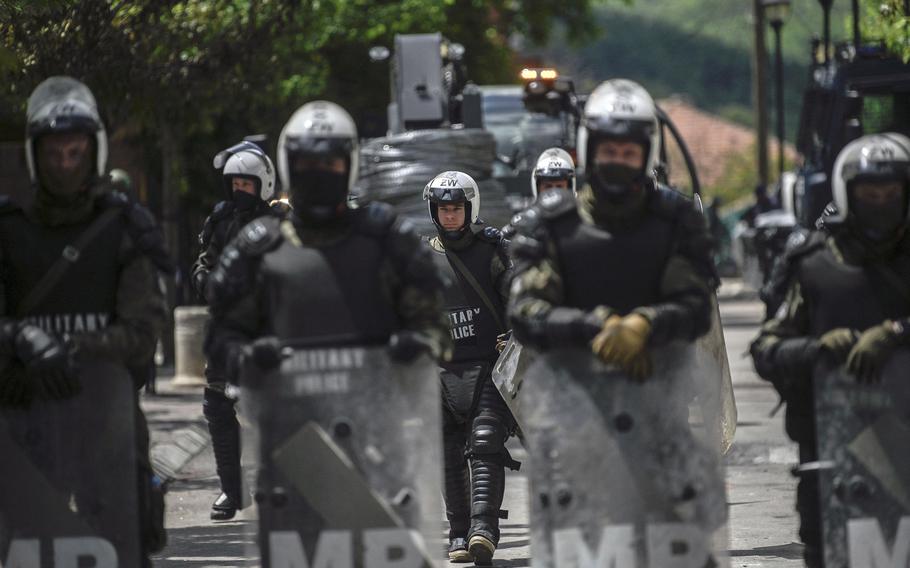Europe
AnalysisViolence in Kosovo exposes perilous limbo in Europe’s powder keg
Bloomberg News June 1, 2023

NATO soldiers and International military police secure the area near Zvecan, northern Kosovo, on May 30, 2023, a day following clashes with Serb protesters demanding the removal of recently elected Albanian mayors. (Armend Nimani, AFP via Getty Images/TNS)
(Tribune News Service) — The worst violence in a decade in Kosovo exposed the political intransigence of a region still in limbo 15 years after the nation declared independence from Serbia, and a tinderbox that takes little to ignite.
Dozens of NATO peacekeepers and Serb protesters were injured over the past five days in unrest sparked by Kosovo’s resolve to put newly appointed mayors into their offices in the north of the country of 1.8 million. Local Serbs boycotted that vote, acting on guidance from the government in Belgrade.
The latest flareup has shone the spotlight again on a region that’s still dogged by the legacy of the 1990s Balkan wars, and the lack of progress in mending ties between the ethnic-Albanian majority and the Serb minority. The danger for the European Union is that it ends up with another conflict on its periphery while facing the next stage in how to confront Russia’s invasion of Ukraine.
At the heart of the intractability is that Kosovo is not ready to give up control over some of its territory and Serbia isn’t ready to recognize Kosovo. Serbia views Kosovo as its own, the cradle of the Orthodox nation.
Any solution would need to be enforced by the international community that has supported Kosovo’s creation and still finances a peacekeeping mission there. Russia and China, meanwhile, back Serbia. Russian President Vladimir Putin has cited Kosovo as an example of what he called the West’s duplicity as he seeks to occupy parts of Ukraine.
“Serbia had part of its territory taken away,” said Zarko Puhovski, political science professor at the University of Zagreb. “It was in the context of horrible attacks on the Albanian population in Kosovo, but still it’s a precedent. Kosovo Serbs should be given a great degree of autonomy, but the issue is whether any autonomy is enough to live in the state called Kosovo.”
In the north of the country, mainly ethnic Serb citizens remain paralyzed economically and reliant on Belgrade. They are neither part of Serbia nor — in practice — part of Kosovo.
Serbian President Aleksandar Vucic demanded the mayors be removed from office before any progress can be made. “This has to be the first move,” he said at the European Political Community conference in Moldova on Thursday. “Then I believe we’ll have enough strength to carry on with our conversation to not only de-escalate the situation, but also to take some steps forward.”
Kosovo Prime Minister Albin Kurti so far has refused to remove police guarding the mayors in the north. “As long as there is this violent mob outside who is ready to attack” then we “must have our special units in the municipal buildings,” Kurti said a day earlier at a security conference in Bratislava.
The recurring violence has shown that every time Kosovo takes steps to enforce its laws over all citizens, the government runs into resistance. Last year, it moved to introduce universal car license plates and identification documents. Both efforts are still to be completed.
Dragisa Milovic, a former mayor of Zvecan near the city of Mitrovica in Kosovo’s north, said that Serbs just want to organize their lives as they see fit. “It is not for Kurti or anyone from Pristina to say what is good for us,” he told Kosovo Online.
Any long-term solution would also depend on Kosovo and Serbia admitting that the current setup is volatile and unsustainable. Both nations have reached several agreements on mending ties brokered by the E.U. and the U.S. But their implementation has lingered. Neither side signed the latest accord.
“There is only one chance for the Kosovo government to resolve that situation, and that is to ask Serbs under which conditions they want to participate in next local election,” said Puhovski. “But the issue here is, do Serbs want to be part of Kosovo under any circumstances?”
With assistance from Andra Timu, Irina Vilcu, Arne Delfs and Ania Nussbaum.
©2023 Bloomberg L.P.
Visit bloomberg.com.
Distributed by Tribune Content Agency, LLC.